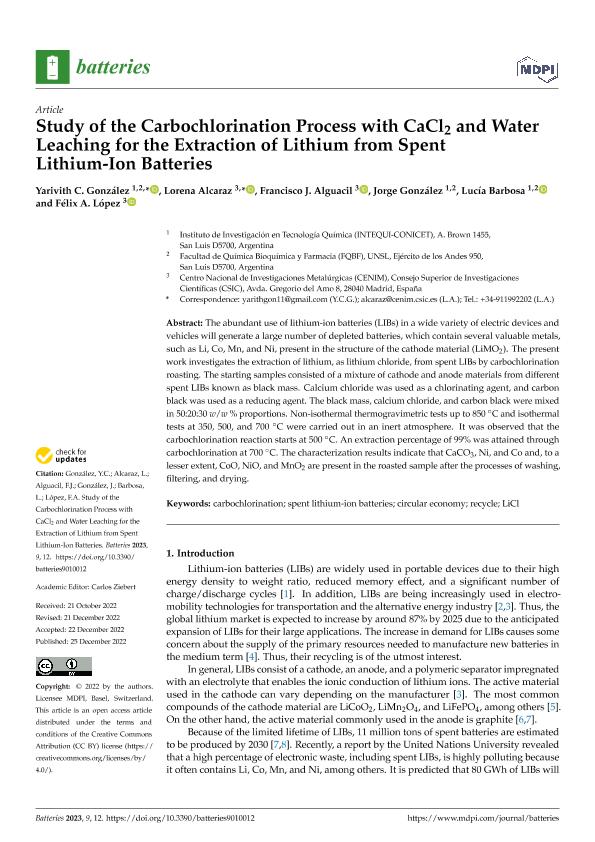Artículo
Study of the Carbochlorination Process with CaCl2 and Water Leaching for the Extraction of Lithium from Spent Lithium-Ion Batteries
Gonzalez Peña, Yarivith Carolina ; Alcaraz Romo, Lorena; Alguacil, Francisco J.; Gonzalez, Jorge Alberto
; Alcaraz Romo, Lorena; Alguacil, Francisco J.; Gonzalez, Jorge Alberto ; Barbosa, Lucía Isabel
; Barbosa, Lucía Isabel ; López, Félix A.
; López, Félix A.
 ; Alcaraz Romo, Lorena; Alguacil, Francisco J.; Gonzalez, Jorge Alberto
; Alcaraz Romo, Lorena; Alguacil, Francisco J.; Gonzalez, Jorge Alberto ; Barbosa, Lucía Isabel
; Barbosa, Lucía Isabel ; López, Félix A.
; López, Félix A.
Fecha de publicación:
12/2022
Editorial:
Multidisciplinary Digital Publishing Institute
Revista:
Batteries
ISSN:
2313-0105
Idioma:
Inglés
Tipo de recurso:
Artículo publicado
Clasificación temática:
Resumen
The abundant use of lithium-ion batteries (LIBs) in a wide variety of electric devices and vehicles will generate a large number of depleted batteries, which contain several valuable metals, such as Li, Co, Mn, and Ni, present in the structure of the cathode material (LiMO2). The present work investigates the extraction of lithium, as lithium chloride, from spent LIBs by carbochlorination roasting. The starting samples consisted of a mixture of cathode and anode materials from different spent LIBs known as black mass. Calcium chloride was used as a chlorinating agent, and carbon black was used as a reducing agent. The black mass, calcium chloride, and carbon black were mixed in 50:20:30 w/w % proportions. Non-isothermal thermogravimetric tests up to 850 °C and isothermal tests at 350, 500, and 700 °C were carried out in an inert atmosphere. It was observed that the carbochlorination reaction starts at 500 °C. An extraction percentage of 99% was attained through carbochlorination at 700 °C. The characterization results indicate that CaCO3, Ni, and Co and, to a lesser extent, CoO, NiO, and MnO2 are present in the roasted sample after the processes of washing, filtering, and drying.
Palabras clave:
CARBOCHLORINATION
,
CIRCULAR ECONOMY
,
LICL
,
RECYCLE
,
SPENT LITHIUM-ION BATTERIES
Archivos asociados
Licencia
Identificadores
Colecciones
Articulos(INTEQUI)
Articulos de INST. DE INVEST. EN TECNOLOGIA QUIMICA
Articulos de INST. DE INVEST. EN TECNOLOGIA QUIMICA
Citación
Gonzalez Peña, Yarivith Carolina; Alcaraz Romo, Lorena; Alguacil, Francisco J.; Gonzalez, Jorge Alberto; Barbosa, Lucía Isabel; et al.; Study of the Carbochlorination Process with CaCl2 and Water Leaching for the Extraction of Lithium from Spent Lithium-Ion Batteries; Multidisciplinary Digital Publishing Institute; Batteries; 9; 1; 12-2022; 1-23
Compartir
Altmétricas



